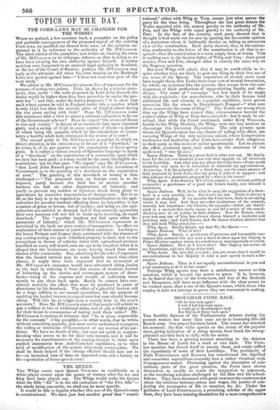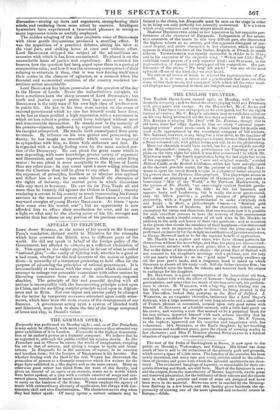BROUGHAM COME BACK.
"Oh for him back again ! I wish I had him back again : I would gie a' Knockhaspie's land
For Highland Harry back again." THE horrible flatness of the Parliamentary debates during the present session has more than once set ua to humming this old Scotch song. Our prayer has been heard. The truant has watched his moment : the first white specks on the crests of the popular wave, giving indication of a rising breeze, have lured the strong- pinioned sea-bird back to dally with the storm. There has been a growing interest attaching to the debates in the House of Lords for a week or two back. The Corn- law question has forced itself in among them, and sorely ruffled the equanimity of some of their Lordships. The pertinacity of Earls Frrzwud.rim and RADNOR has transformed the dignified and somewhat supercilious assembly into a rather vivacious ecole d'eneeignement muted. Protesting against the discussion of sub- ordinate parts of the great question, the Peers have shown themselves as unable to resist the temptation to argument, as the wandering scholars challenged by Gil Blas and his school- fellows. They have discussed with great neatness the controversies about the relations between prices and wages, the justice of sub- jecting the necessaries of life to taxation, &c. &c. Under the guidance of Lord FITZWELLIAM, a promising scholar of the upper form, they have been training themselves for a more comprehensive discussion—storing up facts and arguments, strengthening their minds, and rendering them more adroit by exercise. Intelligent bystanders have experienced a benevolent pleasure in seeing so many ingenuous minds so usefully employed.
The sudden mingling of the clear emphatic voice of BrionostaMt with these gentle disputations produced a startling effect. It was the apparition of a practised debater, aiming his blow at the vital part, and striking home at once and without effort. Lord BROUGHAM stripped the subject of the adventitious ac- cessories with which it has been encumbered. He placed it on the unassailable basis of justice and expediency. He reminded his hearers, how the question had been urged upon them in a period of comparative calm ; and how it was the necessary consequence of their refusing to entertain it then, that it was now forcing itself upon their notice in the clamour of agitation, at a moment when the financial and economical condition of the country rendered im- mediate action unavoidable.
Lord BROUGHAM has taken possession of the question of the day in the House of Lords. Never the indiscriminate eulogists, we have sometimes been the sharp censors of Lord BROUGHAM ; but truth and justice compel praise from lips unused to flatter. BROUGHAM is the only man of his own high class of intellect now in public life. He has in his time done service to the cause of rational government which no one but himself could have done, as he has at times perilled a high reputation with a wantonness in which no less robust a genius could have indulged without utter and irrecoverable destruction. He stands now in the maturity of his powers—ripened, mellowed by experience and time, with all his energies unimpaired. He stands forth emancipated from party trammels. By reliance on his own genius and persevering in- dustry, he has taught an assembly which cannot be expected to sympathize with him, to listen with deference and fear. He is regarded with a kindly feeling even by the most excited por- tion of the Democracy. He can plead the great cause which is now depending, with more knowledge, greater variety of argument and illustration, and more impressive power, than any other living orator : he can plead it more acceptably to the House of Lords than any other man : he can count upon a more willing attention from the Chartists than will be given to any other. By becoming the exponent of principles, heedless as to whether men applaud and follow him or not, be can make himself the champion of the rights of industry, the central point in which discordant wills may meet in harmony. He can do for Free Trade all and more than he formerly did against the Orders in Council ; thereby rendering a service to his country as much transcending his former services as the matured powers of Lord BROUGHAM exceed the wayward energies of young HENRY BROUGHAM. At times " spots have come over his mortal star" ; but an opportunity is now afforded him to efface their recollection for ever, and to cast a light on what may be the closing scene of his life, stronger and steadier than has shone on any portion of his previous career.



























 Previous page
Previous page